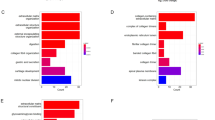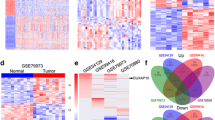Abstract
Background
Identification of gastric cancer-related molecules is necessary to elucidate the pathological mechanisms of this heterogeneous disease. The purpose of this study was to identify novel genes associated with aggressive phenotypes of gastric cancer.
Methods
Global expression profiling was conducted using tissues from four patients with metastatic gastric cancer to identify genes overexpressed in gastric cancer. Fifteen gastric cell lines and 262 pairs of surgically resected gastric tissues were subjected to mRNA expression analysis. The contribution of the candidate gene on gastric cancer cell proliferation, invasion, adhesion, and migration were evaluated using small interfering RNA.
Results
DnaJ heat shock protein family (Hsp40) member C12 (DNAJC12) was identified as a candidate gene by transcriptome analysis. In clinical samples, DNAJC12 mRNA levels were higher in gastric cancer tissues compared with normal adjacent tissues. Patients with high DNAJC12 expression showed significantly shorter overall survival in our cohort and in the extra-validation cohort analyzed by a published microarray dataset. High DNAJC12 expression in gastric cancer tissues was significantly associated with lymphatic involvement, infiltrative growth type, lymph node metastasis, and advanced stage and was identified as an independent prognostic factor for overall survival in multivariable analysis. Increased expression of DNAJC12 was found in 12 of 14 examined gastric cancer cell lines. Knockdown of DNAJC12 expression significantly decreased the proliferation and invasion abilities of gastric cancer cells.
Conclusions
Our findings support DNAJC12 as a candidate gene associated with aggressive phenotypes of gastric cancer.




Similar content being viewed by others
References
Van Cutsem E, Sagaert X, Topal B, Haustermans K, Prenen H. Gastric cancer. Lancet. 2016;388:2654–64.
Kanda M, Kodera Y, Sakamoto J. Updated evidence on adjuvant treatments for gastric cancer. Expert Rev Gastroenterol Hepatol. 2015;9:1549–60.
Wadhwa R, Song S, Lee JS, Yao Y, Wei Q, Ajani JA. Gastric cancer-molecular and clinical dimensions. Nat Rev Clin Oncol. 2013;10:643–55.
McLean MH, El-Omar EM. Genetics of gastric cancer. Nat Rev Gastroenterol Hepatol. 2014;11:664–74.
Kanda M, Kodera Y. Recent advances in the molecular diagnostics of gastric cancer. World J Gastroenterol. 2015;21:9838–52.
Duraes C, Almeida GM, Seruca R, Oliveira C, Carneiro F. Biomarkers for gastric cancer: prognostic, predictive or targets of therapy? Virchows Arch. 2014;464:367–78.
Shevtsov M, Multhoff G. Heat shock protein-peptide and HSP-based immunotherapies for the treatment of cancer. Front Immunol. 2016;7:171.
Straniero L, Guella I, Cilia R, et al. DNAJC12 and dopa-responsive nonprogressive parkinsonism. Ann Neurol. 2017;82:640–6.
Kanda M, Shimizu D, Tanaka H, et al. Metastatic pathway-specific transcriptome analysis identifies MFSD4 as a putative tumor suppressor and biomarker for hepatic metastasis in patients with gastric cancer. Oncotarget. 2016;7:13667–79.
Kanda M, Nomoto S, Oya H, et al. The expression of melanoma-associated antigen d2 both in surgically resected and serum samples serves as clinically relevant biomarker of gastric cancer progression. Ann Surg Oncol. 2016;23 Suppl 2:214–21.
Liu JY, Peng CW, Yang XJ, Huang CQ, Li Y. The prognosis role of AJCC/UICC 8(th) edition staging system in gastric cancer, a retrospective analysis. Am J Transl Res. 2018;10:292–303.
Kanda M, Murotani K, Kobayashi D, et al. Postoperative adjuvant chemotherapy with S-1 alters recurrence patterns and prognostic factors among patients with stage II/III gastric cancer: a propensity score matching analysis. Surgery. 2015;158:1573–80.
Foo M, Leong T. Adjuvant therapy for gastric cancer: current and future directions. World J Gastroenterol. 2014;20:13718–27.
Szasz AM, Lanczky A, Nagy A, et al. Cross-validation of survival associated biomarkers in gastric cancer using transcriptomic data of 1065 patients. Oncotarget. 2016;7:49322–33.
Kanda M, Shimizu D, Fujii T, et al. Function and diagnostic value of Anosmin-1 in gastric cancer progression. Int J Cancer. 2016;138:721–30.
Kanda M, Shimizu D, Tanaka H, et al. Significance of SYT8 for the detection, prediction, and treatment of peritoneal metastasis from gastric cancer. Ann Surg. 2018;267:495–503.
Shimizu D, Kanda M, Tanaka H, et al. GPR155 serves as a predictive biomarker for hematogenous metastasis in patients with gastric cancer. Sci Rep. 2017;7:42089.
Kanda M, Tanaka C, Kobayashi D, et al. Epigenetic suppression of the immunoregulator MZB1 is associated with the malignant phenotype of gastric cancer. Int J Cancer. 2016;139:2290–8.
Miwa T, Kanda M, Tanaka H, et al. FBXO50 enhances the malignant behavior of gastric cancer cells. Ann Surg Oncol. 2017;24:3771–9.
Matz JM, Blake MJ, Tatelman HM, Lavoi KP, Holbrook NJ. Characterization and regulation of cold-induced heat shock protein expression in mouse brown adipose tissue. Am J Physiol. 1995;269:R38–47.
Ikwegbue PC, Masamba P, Oyinloye BE, Kappo AP. Roles of heat shock proteins in apoptosis, oxidative stress, human inflammatory diseases, and cancer. Pharmaceuticals (Basel). 2018;11:2.
Laplante AF, Moulin V, Auger FA, et al. Expression of heat shock proteins in mouse skin during wound healing. J Histochem Cytochem. 1998;46:1291–301.
Johnston CL, Marzano NR, van Oijen AM, Ecroyd H. Using single-molecule approaches to understand the molecular mechanisms of heat-shock protein chaperone function. J Mol Biol. 2018;430:4525–46.
Tsan MF, Gao B. Heat shock protein and innate immunity. Cell Mol Immunol. 2004;1:274–9.
Chen B, Feder ME, Kang L. Evolution of heat-shock protein expression underlying adaptive responses to environmental stress. Mol Ecol. 2018;27:3040–54.
Haug M, Schepp CP, Kalbacher H, Dannecker GE, Holzer U. 70-kDa heat shock proteins: specific interactions with HLA-DR molecules and their peptide fragments. Eur J Immunol. 2007;37:1053–63.
Lee MS, Lee J, Lee S, et al. Clinical, prognostic, and therapeutic significance of heat shock protein 27 in bladder cancer. Oncotarget. 2018;9:7961–7974.
Shen H, Mu C, Wu X, et al. Chemotherapy sensitizes therapy-resistant cells to mild hyperthermia by suppressing heat shock protein 27 expression in triple negative breast cancer. Clin Cancer Res. 2018;24:4900–12.
Blau N, Martinez A, Hoffmann GF, Thony B. DNAJC12 deficiency: a new strategy in the diagnosis of hyperphenylalaninemias. Mol Genet Metab. 2018;123:1–5.
De Bessa SA, Salaorni S, Patrao DF, Neto MM, Brentani MM, Nagai MA. JDP1 (DNAJC12/Hsp40) expression in breast cancer and its association with estrogen receptor status. Int J Mol Med. 2006;17:363–7.
He HL, Lee YE, Chen HP, et al. Overexpression of DNAJC12 predicts poor response to neoadjuvant concurrent chemoradiotherapy in patients with rectal cancer. Exp Mol Pathol. 2015;98:338–45.
Choi J, Djebbar S, Fournier A, Labrie C. The co-chaperone DNAJC12 binds to Hsc70 and is upregulated by endoplasmic reticulum stress. Cell Stress Chaperones. 2014;19:439–46.
Wegele H, Muller L, Buchner J. Hsp70 and Hsp90: a relay team for protein folding. Rev Physiol Biochem Pharmacol. 2004;151:1–44.
Jin H, Xie Q, Guo X, et al. p63alpha protein up-regulates heat shock protein 70 expression via E2F1 transcription factor 1, promoting Wasf3/Wave3/MMP9 signaling and bladder cancer invasion. J Biol Chem. 2017;292:15952–63.
Beere HM, Wolf BB, Cain K, et al. Heat-shock protein 70 inhibits apoptosis by preventing recruitment of procaspase-9 to the Apaf-1 apoptosome. Nat Cell Biol. 2000;2:469–75.
Singh S, Suri A. Targeting the testis-specific heat-shock protein 70-2 (HSP70-2) reduces cellular growth, migration, and invasion in renal cell carcinoma cells. Tumour Biol. 2014;35:12695–706.
Mohammad RM, Muqbil I, Lowe L, et al. Broad targeting of resistance to apoptosis in cancer. Semin Cancer Biol. 2015;35 Suppl:S78–103.
Author information
Authors and Affiliations
Corresponding author
Ethics declarations
Disclosures
None.
Additional information
Publisher's Note
Springer Nature remains neutral with regard to jurisdictional claims in published maps and institutional affiliations.
Electronic Supplementary Material
Below is the link to the electronic supplementary material.
10434_2018_7149_MOESM4_ESM.tif
Supplementary Fig. 1 (a) Expression analyses of DNAJC12 in clinical samples from 262 gastric cancer patients. ROC curve analysis revealed that the AUC value of DNAJC12 levels was 0.606 for detection of mortality of recurrence, and the optimal cutoff value was 0.00925. (b) Expression analysis of DNAJC12 in gastric cancer cell lines. DNAJC12 mRNA levels were detected in differentiated and undifferentiated gastric cancer cell lines and the control FHs74 epithelial cell line (TIFF 6033 kb)
Rights and permissions
About this article
Cite this article
Uno, Y., Kanda, M., Miwa, T. et al. Increased Expression of DNAJC12 is Associated with Aggressive Phenotype of Gastric Cancer. Ann Surg Oncol 26, 836–844 (2019). https://doi.org/10.1245/s10434-018-07149-y
Received:
Published:
Issue Date:
DOI: https://doi.org/10.1245/s10434-018-07149-y




